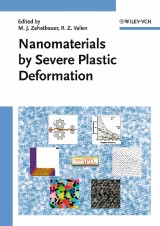Details
Nanomaterials by Severe Plastic Deformation
1. Aufl.
|
322,99 € |
|
| Verlag: | Wiley-VCH (D) |
| Format: | |
| Veröffentl.: | 06.03.2006 |
| ISBN/EAN: | 9783527604944 |
| Sprache: | englisch |
| Anzahl Seiten: | 872 |
DRM-geschütztes eBook, Sie benötigen z.B. Adobe Digital Editions und eine Adobe ID zum Lesen.
Beschreibungen
These proceedings of the "Second International Conference on Nanomaterials by Severe Plastic Deformation" review the enormous scientific avalanche that has been developing in the field over recent years. A valuable resource for any scientist and engineer working in this emerging field of nanotechnology.
I. Reasons to Use Nanostructured Materials. <p>II. Large Strain Cold Working and Microstructure.</p> <p>III. Unique Features of SPD - Microstructure and Properties.</p> <p>IV. Modelling of SPD and Mechanical Properties of SPD Materials.</p> <p>V. Texture Evolution and Simulation During SPD.</p> <p>VI. Details of SPD Nanostructures as Investigated by Electron Microscopy.</p> <p>VII. Analyses of SPD Materials by Selected Physical Methods.</p> <p>VIII. Influence of Deformation Parameters to SPD Nanostructures.</p> <p>IX. New Methods of SPD.</p> <p>X. SPD with Ball Milling and Powder Consolidation.</p> <p>XI. Mechanical Properties and Thermostability of Nanocrystalline Structures.</p> <p>XII. Influence of Deformation Path to Properties of SPD Materials.</p> <p>XIII. Features and Mechanisms of Superelasticity in SPD Materials.</p> <p>XIV. Mechanisms of Diffusion Related Processes in Nanocrystalline Materials.</p> <p>XV. Application of SPD Materials.</p> <p>Author Index.</p> <p>Subject Index.</p>
<b>Michael J. Zehetbauer</b>, Chairman, NanoSPD2, born in 1951 in Austria. Since 1997 he is Professor at the Institute of Materials Physics, University of Vienna, and Head of the Section “Nanocrystalline Materials”. From the late 1980’s he has been author of several fundamental papers on large strain work hardening of metals establishing stages IV and V of plastic deformation. His main scientific fields are experimental investigations and modeling of strengthening processes in metals and polymers, with special emphasis on the conditions under which nanostructures are formed during plastic deformation. A member of several committees of the Austrian Physical Society and the Deutsche Gesellschaft für Materialkunde, he recently was co-opted to the International Steering Committee on Severe Plastic Deformation. <p><b>Ruslan Z. Valiev</b>, Co-Chairman, NanoSPD2, born in 1949 in Russia. Since 1995, he is Professor and Scientific Director of the Institute of Physics of Advanced materials, Ufa State Aviation Technical University in Ufa, Russia. In the early 1990’s Prof. Valiev and his co-workers have pioneered the production of ultrafine-grained and nanostructured metals and alloys by the techniques of severe plastic deformation (SPD). His main research interests comprise studies of strength and ductility, and the modeling of superplasticity of SPD produced nanomaterials. He has acted as co-organizer of several international SPD meetings, among these the NATO Advanced Research Workshop on Investigations and Applications of SPD which was held 1999 in Moscow and initiated the actual NanoSPD conference series. Ruslan Valiev is a member of several international professional committees, among these the International Steering Committee on SPD, the International Committee of Superplasticity, Orlando, USA, and the International Committee for Nanostructured Materials, Sendaj, Japan.</p>
Nanotechnology has spawned the creation of many novel fabrication processes enroute to a nanomaterial, nanophase, or nanomachine. Severe plastic deformation (Equal Channel Angular Pressing – ECAP, High Pressure Torsion – HPT, Accumulated Roll Bonding – ARB, etc.), a highly refined derivative of deformation processing, is beginning to see wide use for obtaining a nanophase microstructure in crystalline solids. It has led to the improved strength of metals and alloys without loss in workability, and to markedly enhanced superplasticity and fatigue properties. Advantages of severe plastic dformation include the production of large specimens and the achievement of nanophase materials without porosity. <p>These proceedings of the “Second International Conference on Nanomaterials by Severe Plastic Deformation” review the enormous scientific avalanche which has been developing in the field during the recent years. It is a valuable resource for any scientist and engineer working in this emerging field of nanotechnology.</p>


















